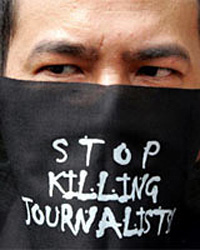
|  |  |  Editorials | Issues | October 2008 Editorials | Issues | October 2008  
Journalists Targeted in Latest Mexico Drug Violence
 David Montero - Christian Science Monitor David Montero - Christian Science Monitor
go to original


| | A newspaper editor, a columnist, police officers, and bar patrons are among those killed in separate acts of violence this past week. | | |
As drug-related violence continues to worsen across the border in Mexico, journalists are being increasingly targeted.

Mexico's widening war with drugs has claimed more than 3,000 lives this year alone. On Sunday, assailants opened fire on the US consulate in the northern Mexican city of Monterrey, reports the Associated Press. Nobody was injured in that attack, but on Saturday gunmen killed six young men at a family party in the gang-plagued Mexican border city of Ciudad Juarez, reports AP.

Saturday night's mass shooting was the second in the border state of Chihuahua in less than a week. Just before midnight Thursday, gunmen opened fire in a bar in the city of Chihuahua, killing 11 people.

The most recent violence underscores yet another frightening dimension in the violence: the targeting of journalists, the San Antonio Express reports.

A newspaper editor, a columnist, police officers, and bar patrons were among those killed in separate acts of violence this week in the unrelenting drug war that has claimed 3,500 lives across the country this year.

Miguel Angel Villagomez, the editor of La Noticia de Michoacan newspaper in the port city of Lazaro Cardenas on the Pacific coast, was kidnapped late Thursday after leaving the newsroom, said a Michoacan police spokesman.

David Garcia Monroy, a columnist at El Diario de Chihuahua newspaper, was among the 11 people killed by gunmen in a bar in the northern city of Chihuahua late Thursday, said Chihuahua police spokesman Eduardo Esparza.

The killings were the latest acts of aggression against Mexican journalists, who are increasingly pressured by narcotics cartels to tone down coverage of the country's brutal drug war.

Behind the surging violence is a shift in the way drugs are delivered to the United States, away from Colombian distribution channels to networks in Mexico, the Atlanta Constitution Journal points out.

The transformation of narcotics trafficking to the Mexican networks started shifting in the 1990s.... Increased interdiction of the Colombian-Cuban delivery routes and the opening of the United States' border to trade handed the Mexicans an opportunity.

The Colombians realized they could hire them out [to transport drugs] and reduce the risk," said Jim Martin, a federal prosecutor in Atlanta who has handled drug cases for nearly 30 years.

Today, Mexico is the key to the Western Hemisphere's lucrative drug trade, the Atlanta Constitution Journal adds.

Mexican distribution rings supply about 90 percent of the cocaine, 80 percent of the methamphetamine and half of the marijuana used in the United States, estimates Rodney G. Benson, the agent in charge of the Drug Enforcement Administration office in Atlanta. A huge proportion of the payload headed for the Atlantic seaboard, the Southeast and the Midwest flows through Atlanta's interstates, a federal report said this year.

And drug cartels are fighting viciously over that trade, Reuters adds.

Mexico's most-wanted man, Joaquin "Shorty" Guzman, head of the Pacific-coast Sinaloa cartel, has declared war on the local drug baron, Vicente Carrillo Fuentes, and sent his foot soldiers to drive out the Juarez cartel. The Gulf cartel based around the Gulf of Mexico coast has joined the fight.

The Sacramento Bee points out that the wave of violence has "put the country at the top of some of the most infamous lists in the world: the country with the most kidnappings, the most violent crimes, the most journalists killed in the Western Hemisphere."

The Sacramento Bee adds that a widespread crackdown has done little to stop the violence.

When President Felipe Calderón took office two years ago, he declared war on the drug cartels and made the fight against crime his No. 1 priority. He sent the army first to his home state of Michoacán, then to the states of Monterrey, Sinaloa and several cities along the US border. Virtually militarizing the country, however, has not brought about the expected results.

José Reveles, an investigative journalist with the Mexican newspaper El Financiero, claims the Calderón government has lost control of the situation. "The delinquents are organized, and the government is disorganized," he says. "Organized crime is challenging the government, and its only response is to react."

Not surprisingly, the spiraling violence has led to a sharp downturn in tourism to Mexico, NBC San Diego reports.

As the body count rises south of the border in the drug cartel war, businesses are also drained of their lifeblood.

Although the weakened economy has had an impact, many say the fear of violence in border cities is to blame. Tourism in cities like Tijuana and Rosarito is about 70 percent down since last year...

[The mayor of Rosarito, Hugo Torres] along with other Mexican mayors say usually the mainstream media does not report that violence in Baja, California is among drug dealers and not against tourists. The mayor said those who were killed in his city were either involved in the drug trade or had a criminal history. |

 |
|  |



